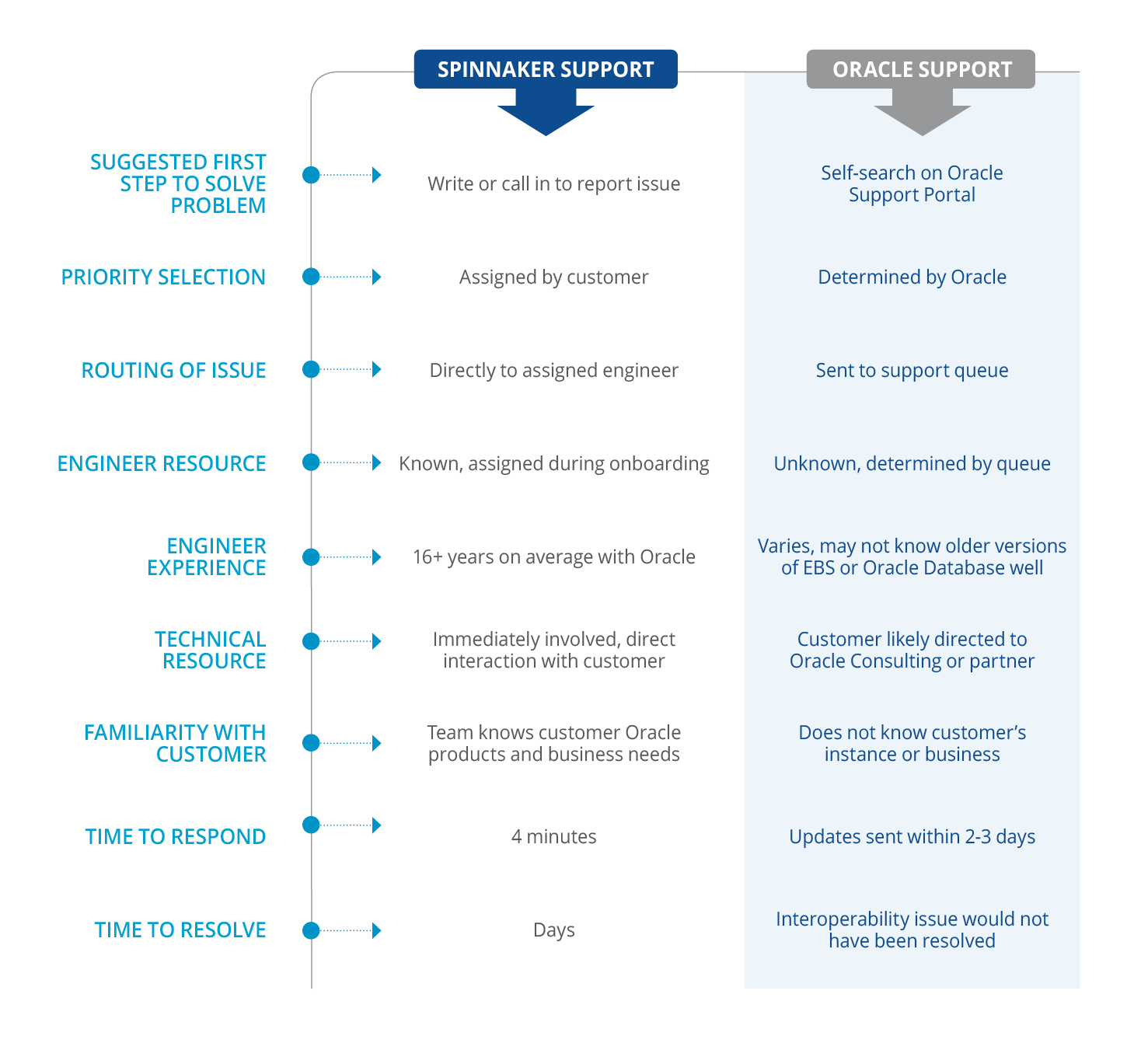November 6, 2019 | Twila Michaels | Senior Support Technical Analyst, Oracle
The example below demonstrates how we resolved not one, but two interoperability issues using a similar technology solution for Oracle Database and E-Business Suite. The story is based on two real support tickets in 2018 and 2019, submitted by a customer company that provides mineral exploration services and drilling products for the global mining industry.
Scene 1 – The First Issue Is Reported
SETTING: Global Mineral Exploration, Salt Lake City, UT, Monday morning.
It was June 25, and Connor was about to panic. As of July 1, their payroll vendor would be turning off the older TLS 1.0 security protocol. Because their current Oracle Database (11.2.0.4) version was using TLS 1.0 and did not make utl_https calls, this meant they would not be able to connect to the web service. They needed to do whatever was required – an upgrade? a patch? – to establish a TLS 1.2 (https) connection from the database to the payroll vendor or GME’s payroll processing could be impacted until the issue was resolved.
While he was aware of the approaching deadline, Connor just hadn’t had the time to consider a solution. He turned to Spinnaker Support, Global Mineral Exploration’s (GME) third-party Oracle support vendor. Chances were the Spinnaker Support engineering team had seen this issue before and would know the most efficient and expedient solution. He logged in to the Spinnaker Support portal and quickly submitted an online Priority 1 (high priority) ticket with details.
Scene 2 – The Ticket Is Received
SETTING: Spinnaker Support, Denver, CO. Monday morning.
Within seconds, the support ticket was routed to Wally, Connor’s designated technical engineer at Spinnaker Support. Wally and Connor had worked closely for the past several years. With over 18 years of Oracle experience, Wally was a trusted, familiar resource who knew GME’s technical environment and applications.
Wally responded within three minutes to let Connor know he had received the ticket and began investigating. Wally verified crucial technical details, including what patches they had installed in the past and began to bring in additional team members for an initial set of solutions.
Scene 3 – Reviewing Options
SETTING: Online Correspondence, Monday and Tuesday
The Spinnaker Support team immediately set out to determine the best possible solution given the need to have a solution within a week. The top candidates included modifying the configurations on the existing F5 load balancer, upgrading Oracle Database to at least version 11.2.0.4.160119 PSU, or installing a Linux virtual machine with an Apache reverse proxy server. The customer researched the F5 option with their network team and found it would not work. The upgrade was possible but would have taken far too long to install, test, would disrupt the business, and risked introducing multiple issues to an already stable system.
This meant the Apache reverse proxy server was the preferred solution. The server was a simple proxy that would accept regular TLS 1.0 (HTTP) traffic from the database, open a TLS 1.2 (HTTPS) connection, and send the traffic to the payroll provider. The Spinnaker Support team had implemented a similar solution for other customers and knew it would work well. This proxy server would move the upgrade to a simpler component and avoid a security risk since the HTTP traffic would all be routed on the internal network.
Scene 4 – The Resolution
SETTING: Online Conference and Correspondence, Wednesday
Connor agreed on the proxy server solution. Spinnaker Support documented the process for the installation and configuration of the Apache 2.4 proxy server and sent it to Connor to implement.
The next day, Connor needed some additional advice, so the teams organized a quick conference call to hash out and verify details around the proper web addresses, ports, and SSL configuration. After testing, Connor determined the proxy server was functioning properly in the test environment. On July 1, he migrated the solution to the production environment, and Spinnaker Support closed the ticket as resolved.
Scene 5 – A Different, But Related, Problem
SETTING: Global Mineral Exploration, Salt Lake City, UT, Over one year later
Connor had a new communication problem. GME had a supplier whose punchout system was integrated into Oracle iProcurement. Punchout enables their buyers to click a link that goes to the supplier’s catalog, search for items on the supplier’s site, and return those items directly to the buyer’s shopping cart.
At an unknown time, the supplier had upgraded their system. GME’s EBS was no longer able to use the punchout system from within iProcurement. Connor logged a P3 ticket with Spinnaker Support with screenshots and documentation to see if they knew of any possible solution GME could implement to fix the problem.
Once again, Wally at Spinnaker Support reviewed the ticket within minutes. Working with Connor, Wally verified facts including that GME had not changed settings recently, they had installed the latest certificate, and the firewall was not the issue. Connor reached out to the supplier for the latest documentation and files, while Wally added Linda from the Spinnaker Support technical team and brought her up to speed on the ticket.
Scene 6 –A Similar Resolution
SETTING: Online Correspondence, Over one week
From the supplier, Linda learned the supplier had renewed their certificates and updated the TSL version, precipitating the issue. She verified the ‘SSL handshake failed: SSLSessionNotFoundErr’ error, meaning the SSL handshake between EBS and the supplier site was not happening. She asked Connor to ask the supplier for the G2 (Generation 2) certificate, then had Connor install and test the certificate. The problem persisted.
Linda then recommended GME set up another entry in their Apache reverse proxy server that they had configured the previous year with Spinnaker’s guidance. Connor agreed and he and Linda set to work. After working for several days through multiple configurations and new error messages, they changed the Apache configuration files so the Apache reverse proxy server converted from http in EBS to https in the supplier program. The punchout now worked, and the case was closed.
REVIEW – Spinnaker Support and Oracle Support Compared
In the above, real-life example, Global Mineral Exploration directly benefited from the comprehensive coverage and assigned in-house expertise of Spinnaker Support. Important lessons include:
- GME did not need Oracle patches to solve the issues. Many Oracle customers believe that publisher patches are the best and only solution for complex errors. At Spinnaker Support, we work hard to quickly fix customer issues without having to apply patches and perform all the testing around other potential issues that can arise with those applied patches. The simplest solution is often best.
- Oracle would not have solved an interoperability issue without a patch. Both tickets involved communications with outside systems, and interoperability is not covered in the standard Oracle Support services. Spinnaker Support works on identifying the source of data and communication issues and resolves them even if are outside of the Oracle product.
- We immediately tap into the staff required to help assess and solve a product issue. At Spinnaker Support, our large, global application and technical teams openly communicate and call on each other for advice, confirmation, and whatever skillset is required. We have no silos to slow down progress or overlook potential solutions.
- A support provider familiar with your systems can solve more problems, faster. Spinnaker Support assigns specific engineers to each customer. These engineers track issues, become conversant with the customer’s products and technical stack, and can even build on past interactions to solve new problems. In this instance, the same server was used to solve two different issues.
This technical ticket characterizes many of the reasons why over 1,100 organizations worldwide have chosen to move their Oracle software support to Spinnaker Support:

Unlike Oracle, Spinnaker Support’s is “support driven,” with an emphasis on more proactive, comprehensive responses and sound technical advice. Third-party support focuses on solving issues quickly, no matter what the source or who is required to weigh-in on the solution. It’s yet another example of our manifesto to provide “support that is actually supportive.”
If you’d like to learn more about Spinnaker Support Oracle services, visit our services page or contact us directly today.

Looking for more Spinnaker Support ticket examples? Download the eBook: “In the Trenches with Third-Party Support” for five true stories from the front lines of third-party support.


